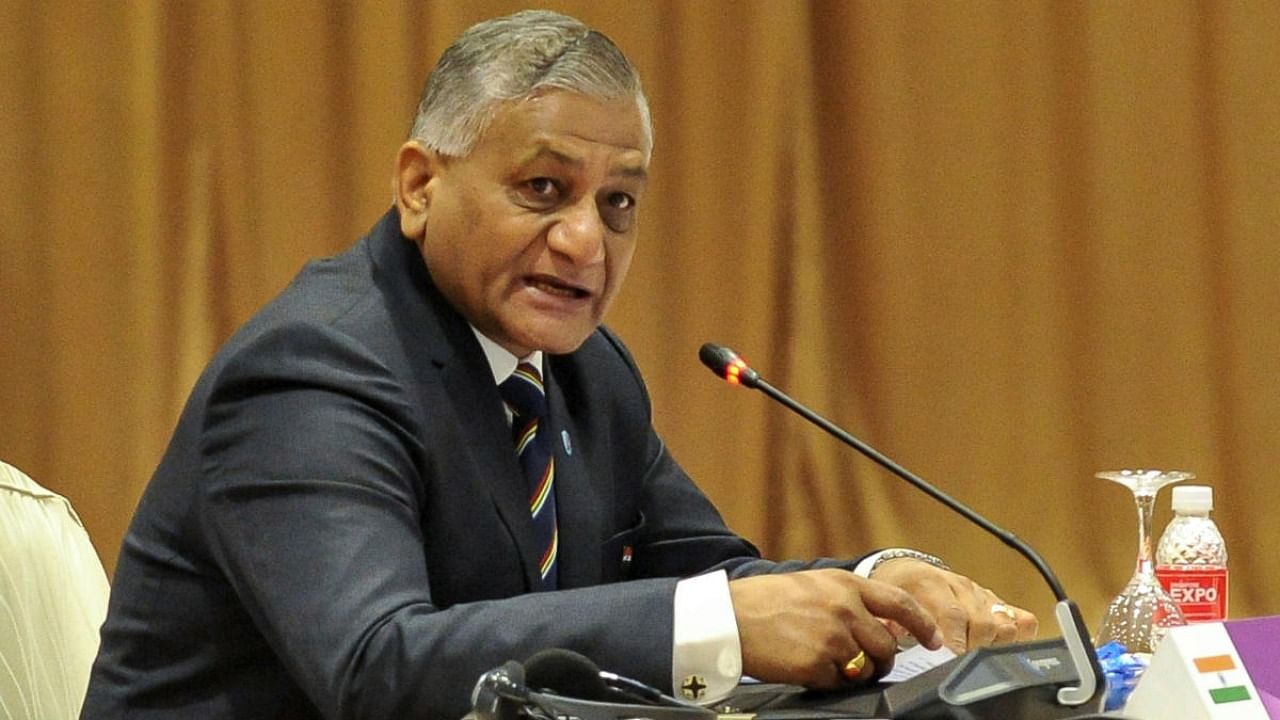
At the completion of 50 years of the victory in the 1971 war against Pakistan, General V K Singh, Union Minister of State for Civil Aviation and former Chief of Army Staff, feels that the people of India need to know more about the valour of our brave soldiers and the Army during the war.
The former soldier said that during the 1971 war, India not only defeated Pakistan decisively but also gave a message to the world by forcing 93,000 Pakistani soldiers to surrender before the Indian Army. This was unprecedented in the military history of the world.
In an interview with IANS, General V K Singh spoke about the sequence of events that led to the war between India and Pakistan in 1971 and how the Indian Army made 93,000 Pakistani troops surrender before them and ended the war in just 13 days. He spoke in length about the preparations made by the Army in the run-up to the war against Pakistan and how the 1971 victory increased India's stature and its professional Army on the global level.
How did the war start between India and Pakistan in 1971?
In 1971, I had spent nearly one and a half years of service in the Indian Army. The Indian Army declared war against Pakistan in December 1971, but the activities at the border had been taking place several months earlier since April 1971. The Pakistani soldiers, who were stationed on the side of East Pakistan (currently known as Bangladesh) used to keep firing on the border along the Indian side. Many refugees were coming to India from across the border during that time.
Apart from this, a lot of activity was taking place along the border during this time and the situation on ground remained the same till December 1971. There was a formal declaration of war only on December 3 after which the Indian Army achieved what was never repeated in the military history of the entire world. I am saying this because we fought in an area where there were rivers and sewers flowing and it was extremely difficult for the movement of vehicles or even to walk.
Fighting there on foot and defeating the enemy in only 13 days and forcing 93,000 Pakistani troops to surrender before the Indian Army was a historic feat in itself. The more research is done and the more said about this extraordinary victory, the better it is because it will make the country aware about what our brave soldiers, the Army and the valiant Army commanders had achieved in 1971.
You are absolutely right that there will not be any other battle in military history, which can lead to a decisive victory in just 13 days and 93,000 soldiers surrendering. What was the strategy of your senior military officers in 1971?
The entire strategy of the 1971 war was made by Air Field Marshal Sam Manekshaw. General Jacob of the Eastern Command did a lot of work and followed the strategy to win the battle. Lieutenant General Sagat Singh of the Army Corps under which we were commanded, played a decisive role in the surrender of Dhaka from the control of Pakistani troops.
"Had General Sagat Singh not marched forward decisively and crossed the Meghna river, perhaps the condition of the Pakistani Army would not have been so bad nor would the Pakistani Army have collapsed so quickly to lose Dhaka."
Apart from this, important victories were also achieved on many other important fronts in the battle. Be it the Battle of Hilli, the crossing of the Meghna and the Madhumati rivers speaks about the indomitable courage with which our army fought and won the war will always be recorded in history. By making a special strategy in the Battle of Mainavati, the way we deceived the Pakistani Army, they had to lay down their arms and surrender before our Army. It was a great fight in terms of strategy and valour and the results of the war were witnessed by the whole world.
You said the formal declaration of war was made on December 3, 1971, but from the month of April, a lot of activity had started taking place along the border. How was the Indian Army preparing for the war during these months?
Till December 1971 the Indian Army did not know that it would declare a war against Pakistan, but still our strategy was clear on how to strengthen ourselves and prepare in time before the war. We were busy with our preparations and were preparing together on many fronts. Our Bengali brothers who were in 'Mukti Bahini' (liberation army) consisting of the Bangladeshi military, paramilitary and civilians during the War of Liberation that transformed East Pakistan into Bangladesh in 1971. They played a significant role during the war.
After the historic victory in the 1971 war, how did the stature of India and the Indian Army rise on the international stage?
From the month of April 1971, the Indian Army had started strengthening itself. The entire strategy for the war was made by Air Field Marshal Sam Manekshaw. Our brave soldiers and Army commanders on the front showed immense bravery and forced 93,000 Pakistani soldiers to surrender before us.
Former Prime Minister Indira Gandhi must be praised for the way she had prepared a political strategy during 1971 because she did everything that a good strategist ought to have done at that time.
Watch latest videos by DH here: